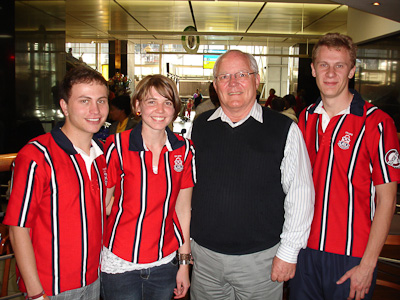Latest News Archive
Please select Category, Year, and then Month to display items
19 November 2018
|
Story Charlene Stanley
|
Photo Charlene Stanley
 Prof John Mubangizi, Dean of the Faculty of Law, encouraged delegates at the Fifth Annual International Mercantile Conference to share ideas on best international practice in their various fields.
Prof John Mubangizi, Dean of the Faculty of Law, encouraged delegates at the Fifth Annual International Mercantile Conference to share ideas on best international practice in their various fields.
“Don’t say anything online that you wouldn’t want plastered on a billboard with your face on it.”
This famous quote by international tech expert Erin Bury should be a guiding light when it comes to online habits in the workplace, according to Francois Cilliers, UFS Lecturer in Mercantile Law.
In his presentation Could Social Media be the Gateway to Employment Discrimination? he warned that employees have a responsibility not to bring their employers in disrepute through their comments on social media.
“Posts, updates, tweets, and comments are considered to be publications and can therefore never be seen as privileged information,” he explained.
Responsibility on employees and employers alike
He pointed out that employers also had a responsibility regarding the way in which they use the information about prospective employees obtained via social media.
“Nowadays, approximately 75% of companies hire through social media. In the US, recruiting companies spend hours researching candidates, making full use of what they can find on social media. It was found that 50–80% of employers frowned upon posts and pictures featuring drug and alcohol abuse, profanity, and bad grammar.”
He warned that employers needed to tread lightly, as a decision not to employ someone as a result of information on the prospective employee’s political views and sexual orientation could constitute unfair discrimination as set out in the Employment Equity Act.
“An employer who wishes to use a screening process (utilising social media) has to prove that the information and the process is objectively necessary and can be justified with reference to the inherent requirements of the job,” he explained.
“As technology and electronic systems advance, so too should the applicable labour laws.”
Cilliers’ presentation formed part of the Fifth Annual International Mercantile Law Conference recently hosted by the Faculty of Law on the Bloemfontein Campus.
Incorporating new technology in teaching and research
“This conference is an opportunity to share ideas on best practice in what is perceived as a ‘difficult’ field within Law,” said Prof John Mubangizi, Dean of the Faculty of Law, as he opened the proceedings. Topics in the discussion sessions ranged from Racism in the workplace and The underrepresentation of females in the judiciary, to Decriminalisation of cannabis: A recipe for healthy employer-employee relations?
“Conferences such as these help us to take advantage of the newest developments in technology to advance our teaching and research,” said Prof Mubangizi.
“To quote Einstein: ‘We can’t solve problems by using the same kind of thinking we used when we created them.’”
Kovsies still enjoy successful exchange opportunity
2010-08-25
 |
| Students Ian Botha, Lize Swart and SW Meintjies with Prof. Izak Groenewald (second from right) at the O.R. Tambo International Airport in Johannesburg upon the student’s recent departure to Virginia Tech. Photo: Supplied |
More than a decade ago, the then Chairperson of Free State Agriculture, Piet Gous, in collaboration with the then Dean of the Faculty of Natural and Agricultural Sciences at the University of the Free State (UFS), Prof. Piet Wilke, started an exchange initiative which still makes a difference to students’ lives today.
Students at the university get the opportunity to go and study at the Virginia Polytechnic Institute and State University (Virginia Tech) in Blacksburg in the United States of America (USA) during the second semester. During the first semester the UFS then receive American students. Since its inception in 1998, 142 students have already participated in the exchange programme.
“It is not only about six months’ studies at an American university. It is about the expansion of horizons, the creation of new frames of reference and exposure to other cultures and customs in order to attain and experience more life capacity,” says Prof. Izak Groenewald, Director of the Centre for Sustainable Agriculture and Rural Development at the UFS. Prof. Groenewald has acted as coordinator of this student exchange programme since 1997.
According to Prof. Groenewald, the secret of the successful programme rests with the fact that Kovsies pay their tuition and accommodation fees at the UFS as if they were studying here. However, they enjoy the privileges at Virginia Tech. Similarly, the American students pay their corresponding fees at Virginia Tech and then enjoy the privileges offered by the UFS.